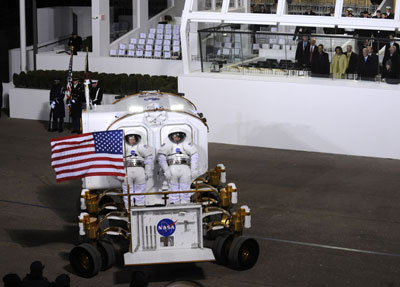Obama picks a Tea Party Tax Day for his space summitby Michael Huang
|
| If NASA supporters start talking about space on Tax Day, they will look out of place and out of touch. |
The Tax Day space summit could publicly split conservatives, with Tea Party conservatives in favor of eliminating programs, and Reagan-Bush conservatives in favor of an ambitious space program. Driving a wedge into the Republican Party makes it easier for Obama to advance his agenda on all fronts.
The summit puts NASA’s bipartisan supporters in a tough spot. The dominant theme of April 15 will be taxes. If NASA supporters start talking about space on Tax Day, they will look out of place and out of touch. Even the urgent issue of jobs will be temporarily overshadowed by taxes on this one day.
The media coverage last year, on April 15, 2009, centered on the Tea Party protests. Obama’s schedule for that day included remarks on the tax code and tax relief. Worse, the Florida space summit clashes with the National Space Symposium in Colorado Springs, where NASA Administrator Charles Bolden is still listed as a featured speaker that day.
NASA supporters should push for the administration to change the date of the summit and remove one source of politicization. If the White House refuses to change the date, it should be questioned on whether it is using the timing of this summit for political purposes.
Another problem for the space summit is the issue of trust. Obama’s campaign originally proposed delaying Constellation for five years as a means of helping fund its education plan. His second plan scrapped the delay and endorsed the goal of returning to the Moon by 2020, a promise made during the presidential campaign. After being elected, Obama’s third proposal is to kill Constellation and cancel that 2020 lunar return. The fact-checking website PolitiFact.com classified it as a broken promise. Obama will undoubtedly make many fine pronouncements at the space summit, but from his track record of flip-flops and broken promises, some of his audience will be disinclined to believe.
| NASA supporters should push for the administration to change the date of the summit and remove one source of politicization. |
Obama is on the record saying that he supports human spaceflight, but his actual actions in the budget say otherwise. No robotic programs are being killed or modified to the same radical extent as Obama’s treatment of human spaceflight. There is a world of difference between Obama’s favored and least favored programs. In Obama’s vision for NASA, human spaceflight occupies the lowest rung in the hierarchy, and receives the worst treatment, while his public relations machine tries to give it a positive spin.
Unfortunately for public relations, the administration could not suppress the obvious joy and delight of anti-human spaceflight partisans. Bob Park and Steven Weinberg lauded the proposed termination of Moon and Mars missions, ruining the administration’s carefully-worded press releases and sound bites.
Commentators have described Obama’s decision as a symbol of American decline. The nation that once achieved greatness does not have the will or capacity to go back or go further. The sad thing is this decline was not forced, but made through choice.
Unhappy with the fallout in the media and in Congress, the administration is putting the ball in the president’s hands. Obama managed to fool a state and a nation during the campaign, and he might do it again on Tax Day. But his audience is wiser and more cynical than ever.
